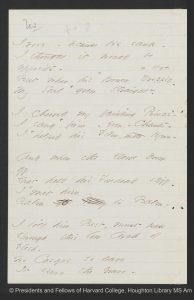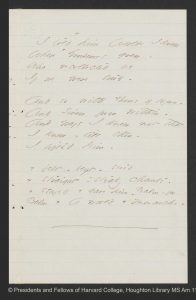I rose – because He sank –
I thought it would be
opposite –
But when his power dropped –
My Soul grew straight.
I cheered my fainting Prince –
I sang firm – even – Chants –
I helped his Film – with Hymn –
And when the Dews drew
off
That held his Forehead stiff –
I met him (gave him) –
Balm to Balm (Balm for Balm) –
I told him Best – must pass
Through this low Arch of
Flesh –
No Casque so brave
It spurn the Grave –
I told him Worlds I knew
Where Emperors grew –
Who recollected us
If we were true –
And so with Thews of Hymn –
And Sinew from within –
And ways I knew not that
I knew – till then –
I lifted Him –
Link to EDA manuscript. Originally in: Poems: Packet XXXIV, Fascicle 21, written in ink, ca. 1862. First published in Atlantic Monthly, 143 (March 1929), 327, and Further Poems (1929), 93, with stanzas 2 and 3 omitted and stanza division not retained. Courtesy of Houghton Library, Harvard University, Cambridge, Mass.
This poem addresses power imbalances across a number of relationships. Several critics, including feminist critics, offer Charlotte Brontë’s novel, Jane Eyre as a background (see the discussion of this in “On Choosing the Poems” for this week). Wendy Martin, for example, asserts: “In addition to being a direct response to the novel, this poem describing Jane’s increasing strength and control is a paradigm for Emily Dickinson’s emotional growth in general.” Other readers see the poem as describing Dickinson’s increasing poetic confidence and the development of her relationship to her Muse.
This poem can be compared to a later poem, dated to 1864, with a similar opening line:
She rose to his Requirement –
dropt
The Playthings of Her Life
To take the honorable
Work
Of Woman, and of Wife – (F857A, J732)
Still others read this poem in a religious light. Cynthia Wolff argues that as long as “God’s legend on earth remained strong, Dickinson could forge a poetic Voice of immense power by juxtaposing it against the force of the Divinity.” But the “fading of God’s presence,” which Wolff argues could already be felt in Amherst in 1862 and was further exacerbated by the devastation of the Civil War, “is a unique impediment to the poet’s efforts to assert eye/I. Thus one response to God’s decline is a remarkable effort to revive Him,” embodied in this poem.
Wolff points out the series of reversals in the poem: the speaker’s “phallic rectitude” and final “erection:” “I lifted Him – ”. In stanzas four and five the speaker quotes Jesus’ own word from Matthew 7:13-14:
Enter ye in at the strait gate: for wide is the gate, and broad is the way, that leadeth to destruction, and many there be which go in thereat: Because strait is the gate, and narrow is the way, which leadeth unto life, and few there be that find it.
Another Biblical echo resonates in the word “Sinew,” which evokes the place of Jacob’s injury when he wrestled with the Angel.



